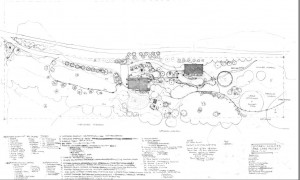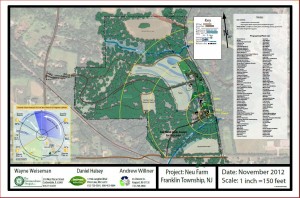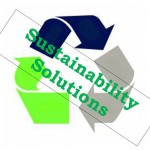Sustainability Solutions was founded in April 2008 to provide municipalities with the tools they need to develop sustainably; for businesses to operate in a way that leaves a smaller footprint, and for non-profit organizations to benefit from Mr. Willner’s experience in management, fund raising, strategic planning and communication. For more information email Andrew.willner@gmail.com.
- Municipalities are facing a new reality – diminishing resources and increasing demand for services. Managing storm water and land use through Low Impact Development (LID) is “smart growth.” Converting Brownfields to Greenfields is another way to improve the local economy and quality of life, and attracting new “clean tech” industries, and “green collar jobs” as non- residential tax ratables are some ways that Andrew Willner and Sustainability Solutions can provide counsel.
- Businesses have and unprecedented opportunity to increase their bottom line, and leave a smaller footprint on the Earth. Andrew J. Willner and Sustainability Solutions can provide a direction away from the traditional relationship that usually pits the environment against the economy. Instead of pursuing economic activities and distribution as primary, and looking at the consumption of natural resources and the impact on the environment as incidental, businesses that wish to compete in the new economy will put the environment first. Businesses must commit to conserving resources, including habitat resources, It also means including the environmental or “external costs” of an economic activity as integral to that activity and not treating those costs as incidental or an afterthought – nor as clean up or mitigation.
- Non-profit organizations are dealing with more difficult and expensive issues as government agencies do less. Using the strategic planning, board and program development, management, communication, and fundraising expertise provided by Andrew J. Willner and Sustainability Solutions will enable organizations to operate more efficiently and achieve mission objectives.
Andrew Willner and Sustainability Solutions working with strategic partners can provide Permaculture design services for individuals and institutions.
Permaculture is a branch of ecological design and ecological engineering that develops sustainable human settlements and self-maintained agricultural systems modeled from natural ecosystems. The core tenets of Permaculture are:
• Take Care of the Earth: Provision for all life systems to continue and multiply. This is the first principle, because without a healthy earth, humans cannot flourish.
• Take Care of the People: Provision for people to access those resources necessary for their existence.
• Share the Surplus: Healthy natural systems use outputs from each element to nourish others. We humans can do the same. By governing our own needs, we can set resources aside to further the above principles.
Permaculture draws from several disciplines including organic farming, agroforestry, intergrated farming, sustainable development, and applied ecology. “The primary agenda of the movement has been to assist people to become more self reliant through the design and development of productive and sustainable gardens and farms. The design principles which are the conceptual foundation of Permaculture were derived from the science of systems ecology and study of pre-industrial examples of sustainable land use.“
Permaculture design emphasizes patterns of landscape, function, and species  assemblies. It asks the question, “Where does this element go? How can it be placed for the maximum benefit of the system?” To answer this question, the central concept of Permaculture is maximizing useful connections between components and synergy of the final design. The focus of Permaculture, therefore, is not on each separate element, but rather on the relationships created among elements by the way they are placed together; the whole becoming greater than the sum of its parts. Permaculture design therefore seeks to minimize waste, human labor, and energy input by building systems with maximal benefits between design elements to achieve a high level of synergy. Permaculture designs evolve over time by taking into account these relationships and elements and can become extremely complex systems that produce a high density of food and materials with minimal input.
assemblies. It asks the question, “Where does this element go? How can it be placed for the maximum benefit of the system?” To answer this question, the central concept of Permaculture is maximizing useful connections between components and synergy of the final design. The focus of Permaculture, therefore, is not on each separate element, but rather on the relationships created among elements by the way they are placed together; the whole becoming greater than the sum of its parts. Permaculture design therefore seeks to minimize waste, human labor, and energy input by building systems with maximal benefits between design elements to achieve a high level of synergy. Permaculture designs evolve over time by taking into account these relationships and elements and can become extremely complex systems that produce a high density of food and materials with minimal input.
Permaculture is an approach to designing human settlements and agricultural systems that is modeled on the relationships found in nature. It is based on the ecology of how things interrelate rather than on the strictly biological concerns that form the foundation of  modern agriculture. Permaculture aims to create stable, productive systems that provide for human needs; it’s a system of design where each element supports and feeds other elements, ultimately aiming at systems that are virtually self-sustaining and into which humans fit as an integral part.
modern agriculture. Permaculture aims to create stable, productive systems that provide for human needs; it’s a system of design where each element supports and feeds other elements, ultimately aiming at systems that are virtually self-sustaining and into which humans fit as an integral part.
Andrew Willner is spearheading an effort to create A Bright Green Future for the New York City Bioregion.
The global Transition movement also offers us important models for local sustainability, and represents a promising way of engaging people and communities to take the far-reaching actions necessary to move beyond peak oil, climate change and economic crisis.
The Transition model is based on a loose set of real world principles and practices built up over time through experimentation and observation by Transition communities around the world as they drive forward to reduce carbon emissions and build community resilience. Underpinning the model is recognition of the following: peak oil, climate change and the economic crisis require urgent action;a world with less oil is inevitable so adaptation now is essential;it is better to plan and be prepared, than be taken by surprise;industrial society has lost the resilience to cope with shocks to its systems so we must act together now to work our way down from the “peak”; using all of our skill, ingenuity and intelligence, our home-grown creativity and cooperation,we can unleash the collective genius within our communities, leading directly to a more abundant, connected and healthier future for all.
Andrew Willner participates in and supports Monmouth Transition, The Mid-Atlantic Transition Hub, The NJ Transition Hub, and Genesis Farm where “Deep Transition” is part of the Farm’s mission. He is also working locally on Rosendale NY Transition.



